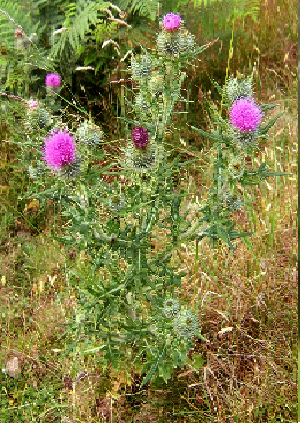
Bull thistle (Cirsium vulgare) is a biennial plant known for its spiky leaves and purple flowers. While often considered a weed, it has been used in traditional medicine for its nutritional and medicinal properties. Each part of the plant — leaves, flowers, and roots — offers unique health benefits.
Uses and Benefits
Leaves
- Edible Greens: The young leaves of bull thistle can be eaten raw or cooked. They are best harvested early in the spring when they are tender. The spines can be removed, and the leaves can be added to salads or steamed like spinach.
- Detoxification: The leaves are known for their diuretic properties, helping to flush toxins from the body and support kidney health.
- Wound Healing: Crushed leaves have been traditionally used as a poultice for cuts and wounds due to their antimicrobial properties.
Flowers
- Natural Sweetener: The flower heads contain nectar that can be used to make a sweet tea or as a sugar alternative in cooking.
- Digestive Aid: Consuming tea made from the flowers may help stimulate digestion and soothe stomach discomfort.
- Rich in Antioxidants: The flowers are high in flavonoids, which help combat oxidative stress and support overall health.
Roots
- Liver Support: The roots are traditionally used to support liver health, similar to milk thistle. A decoction made from the roots is believed to cleanse the liver and improve its function.
- Anti-inflammatory Properties: Root extracts may help reduce inflammation in the body, making it beneficial for conditions like arthritis.
- Nutrient-Rich: